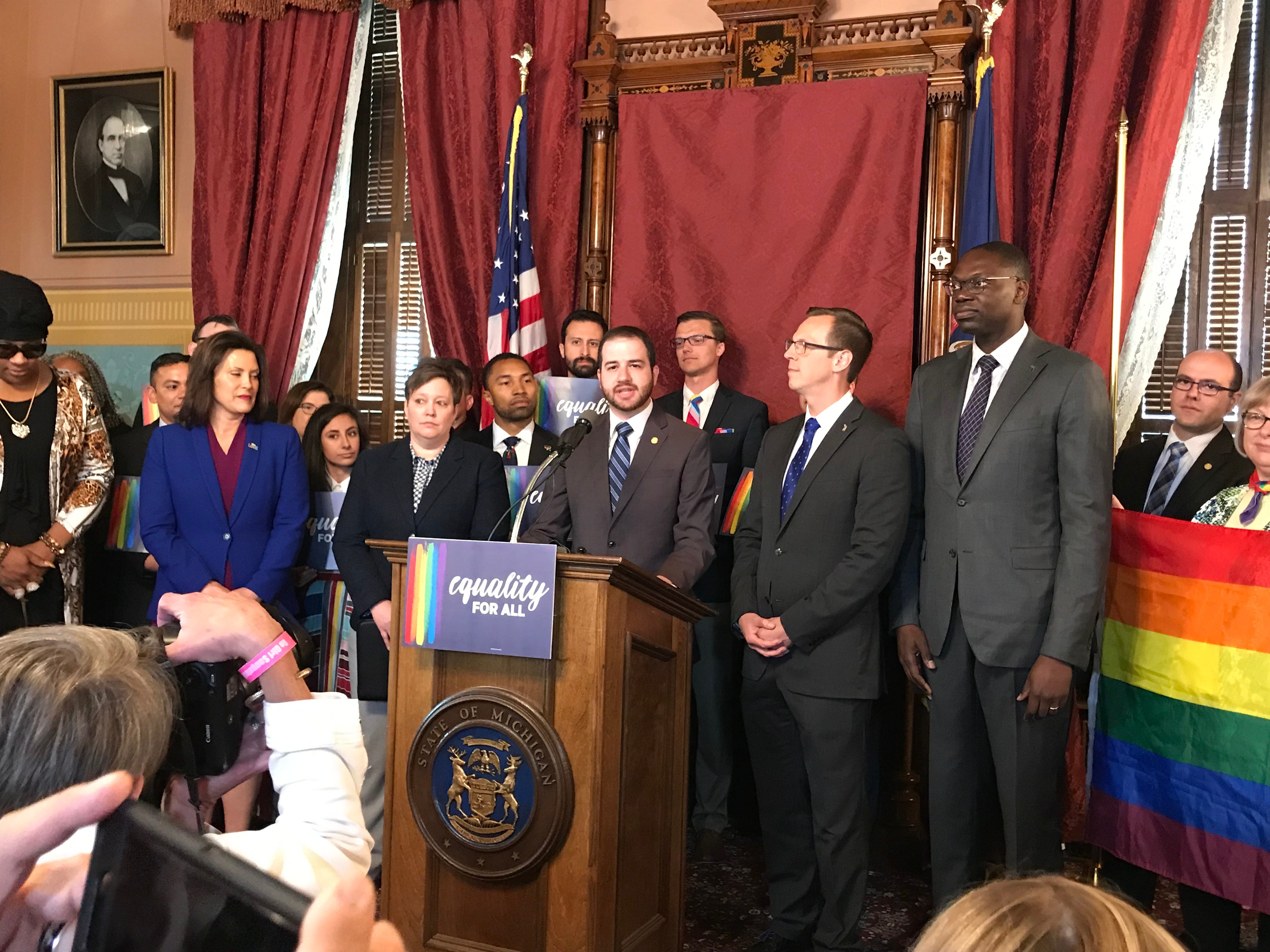Whitmer won't rule out ballot initiative to protect gays against bias
 Beth LeBlanc
Beth LeBlanc
Lansing — Gov. Gretchen Whitmer wouldn’t rule out the possibility of a citizen-led ballot initiative to expand the state's Elliott-Larsen Civil Rights Act to include gays should legislative efforts to do the same be opposed by the GOP majority.
Republican House and Senate leaders have opposed amendments to Michigan's civil rights law that would provide protection for gays, transgender people and others, noting a desire for religious exemptions.
At a Tuesday press conference on the proposed legislation, Whitmer said she hoped Republican leadership and the business community would see the “wisdom” of the measure but “if we aren’t able to get that done, I wouldn’t put it past the will of the people to get this done.”
“We’ve seen the people of Michigan right the laws that need to be righted, we’ve seen them speak up when the Legislature doesn’t reflect what their values are,” Whitmer said.
The proposed bills would add sexual orientation and gender identity as protected classes under the Elliott-Larsen Civil Rights Act of 1976 in a bid to prohibit discrimination against the LGBT community on housing, public accommodations, employment and more.
Democratic Sen. Jeremy Moss and Rep. John Hoadley, co-sponsors of the bill and the first openly gay members of the Legislature, said they’re optimistic about support from some Republican lawmakers, noting their presence in the Legislature has moved the needle on the issue
“Just by being our authentic selves, we have moved the conversation,” said Moss, D-Southfield. “Nobody in the Legislature can say they don’t know somebody in the LGBT community because we’re there.”
Moss said he doesn’t see a need for religious exemption in the bill, citing a lack of conflicts with his own Jewish religion.
“My religion does not conflict with my sexual orientation,” Moss said. “So there’s no rub there that I see that somehow we have to have religious protections in order for me and people in my community to be allowed to live in spaces, to be allowed to work in spaces without discrimination.”
Moss said he feels an obligation to propose the changes to state law through legislation — “the quickest, the least expensive and the most moral way to move this forward” — instead of relying solely on a citizen-led initiative.
“I can’t sit here and say I’m not going to push legislation forward and work hard because somehow the citizens will come up with their own proposal,” Moss said. “If people want to do that, we can re-examine how we can support that effort.”
The state Civil Rights Commission last year issued an interpretive statement holding that current law offers some protections for gay and transgender residents.
In July, Republican then-Attorney General Bill Schuette said only lawmakers could make that call. The commission ignored his opinion, and the Michigan Department of Civil Rights has continued to investigate complaints based on sexual orientation and gender identity.
But Hoadley said more is needed to enshrine the protections in law.
“We need to make sure that we put pen to paper, that we put our values into the laws of Michigan” to ensure that LGBTQ rights aren’t dependent “on who happens to sit in that seat on the civil rights commission,” Hoadley said.
Senate Majority Leader Mike Shirkey told The Detroit News earlier this year that efforts to expand the civil rights act would be “heavily contested” in the GOP-led Legislature unless protections for religious freedom were incorporated.
On Tuesday, the Clarklake Republican said the newly introduced proposal would follow the normal legislative process.
“It will get assigned to committees … and we’ll see what happens,” he said.
Earlier this year, House Speaker Lee Chatfield said in a taping of “Off the Record” on WKAR-TV that he didn’t plan to hold a vote this term on any gay rights legislation. The Levering Republican won election to the state House in 2014 after knocking off an incumbent Republican he criticized for pushing to expand the state’s anti-discrimination law.
“I do not believe we can pass this law while still protecting religious freedom,” Chatfield said.
The bill will be referred to House committee, but whether it is discussed will be up to the committee chair, said Chatfield spokesman Gideon D’Assandro.
eleblanc@detroitnews.com
(517) 371-3661